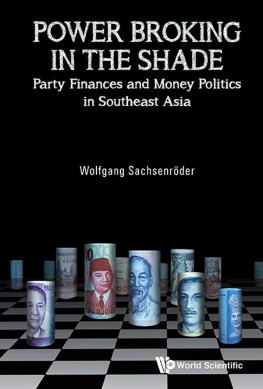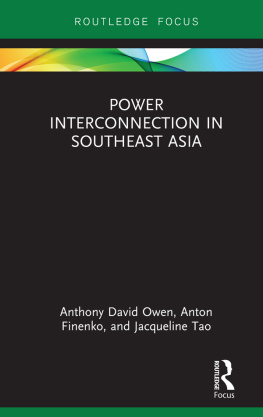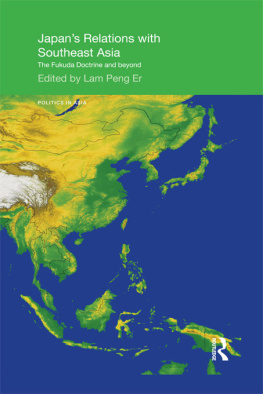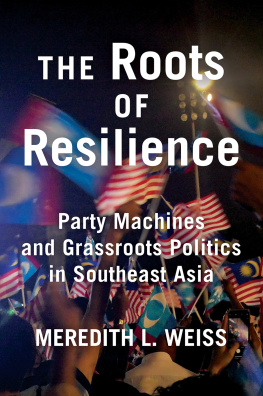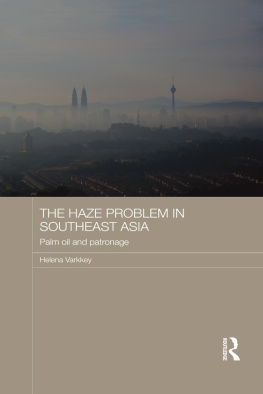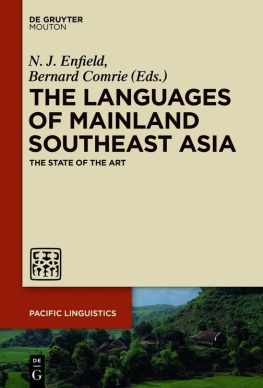

Published by
World Scientific Publishing Co. Pte. Ltd.
5 Toh Tuck Link, Singapore 596224
USA office: 27 Warren Street, Suite 401-402, Hackensack, NJ 07601
UK office: 57 Shelton Street, Covent Garden, London WC2H 9HE
Library of Congress Cataloging-in-Publication Data
Names: Sachsenrder, Wolfgang, author.
Title: Power broking in the shade : party finances and money politics in Southeast Asia /
Dr. Wolfgang Sachsenrder.
Description: New Jersey : World Scientific, [2018] | Includes bibliographical references.
Identifiers: LCCN 2017060744 | ISBN 9789813230736 (hardcover)
Subjects: LCSH: Political parties--Southeast Asia. | Campaign funds--Southeast Asia. |
Political corruption--Southeast Asia. | Southeast Asia--Politics and government--21st century.
Classification: LCC JQ750.A979 S23 2018 | DDC 324.2/10959--dc23
LC record available at https://lccn.loc.gov/2017060744
British Library Cataloguing-in-Publication Data
A catalogue record for this book is available from the British Library.
Copyright 2018 by World Scientific Publishing Co. Pte. Ltd.
All rights reserved. This book, or parts thereof, may not be reproduced in any form or by any means, electronic or mechanical, including photocopying, recording or any information storage and retrieval system now known or to be invented, without written permission from the publisher.
For photocopying of material in this volume, please pay a copying fee through the Copyright Clearance Center, Inc., 222 Rosewood Drive, Danvers, MA 01923, USA. In this case permission to photocopy is not required from the publisher.
For any available supplementary material, please visit
http://www.worldscientific.com/worldscibooks/10.1142/10726#t=suppl
Desk Editor: Karimah Samsudin
Typeset by Stallion Press
Email:
Printed in Singapore
CONTENTS
FOREWORD
With the entry into force of the ASEAN Charter in 2008, the principles of democracy, rule of law and good governance, respect for human rights, and fundamental freedoms have become an integral part of our political landscape. However, they have been integrated into the respective national systems of the member countries in different degrees and forms, depending on the respective political culture and historical experience. Their implementation is an exercise in progress, slower in some aspects and faster in others, like everywhere else in the world. While regular elections contested by political parties are common practice, governments and ruling parties are not changing that often, with some remaining in power for decades.
With the increasingly easy and affordable access to the media, citizens and voters are better informed about politics and political parties than ever before and, consequently, more critical as well. One of the most common and controversial criticisms of political parties is their funding. Many national party laws require an extensive infrastructure with local branches and regular staff in the provinces, thus creating already a significant cost factor. With the development of national, provincial, and local elections, the election campaigns have become more and more expensive, including rallies, posters, fliers, and TV- and radio airtime. This enormous inflation of campaign costs could not be met with the traditional instruments of self-funding mechanisms like membership fees in mass parties, which have nearly disappeared even where they originated, in Western Europe. And, like the European example shows, even generous public funding will never fully cover the running and campaign costs. The parties depend on donations, and that is where the criticism regularly starts, and where vested interests are commonly not only suspected but do visibly exist. The national solutions for this dilemma in Southeast Asia have been creative. Some parties have elected tycoons as leaders, some have left the acquisition of funds to their candidates, some have created their own business networks, some have used the state budgets, and others have found ways to get commissions from development and infrastructure projects.
The overarching regional similarities are related to enormous sums of money and a very high turnover of funds, which make it difficult to avoid the dangers of corrupt practices and the influence of vested business interests. Equally common, therefore, are efforts to fight corruption or, at least, limit illegal flows of money. Strings of scandals undermine the image of politicians and the legitimacy of governments. Informed voters expect a minimum level of transparency, cleanliness, and fairness from political parties and their leaders. It is therefore urgent to strengthen and ensure the legality and legitimacy of the party performance and party rule in the region. Political stability is of paramount importance for the growth of our economies and the further integration of ASEAN.
This book is the first comprehensive comparative study on political funding covering all the nine ASEAN countries with a parliamentary democratic system, most of them with multi-party systems. May this study contribute to the awareness and the commitment of the political players to the necessary reforms of our community.
Dr. Surin Pitsuwan (19492017)
Foreign Minister of Thailand, 19972001
ASEAN Secretary General, 20082013
ACKNOWLEDGEMENTS
My special thanks go to the ISEAS-Yusof Ishak Institute and its extremely helpful library services. Numerous ISEAS seminars and lectures have offered me information and additional insight into the political developments of the region, as well as many discussions with the researchers and fellows. Without this supportive environment the book had not been possible.
Dr. Surin Pitsuwan, former foreign minister of Thailand and ASEAN General-Secretary, who had already written the foreword for my 2014 book, prematurely passed away before I could properly thank him for the present one. May this book contribute a little step toward his vision of a truly democratic and rule-based ASEAN community.
INTRODUCTION:
THE FINANCES OF POLITICAL PARTIES IN SOUTHEAST ASIA
Political Parties between Democratic Transparency and Funding Requirements
Southeast Asia, riding on a wave of economic and asset growth in the last few decades, has developed a high level of money politics and enrichment opportunities for all sorts of political entrepreneurs. The part played by political parties in this game, and the different methods of securing enough funding for the management of the party machinery and the increasingly costly election campaigns vary from country to country and within the countries. However, the basic pattern can be described as a skillful move to blur the distinction between big business, state funds, and political parties, in order to control and manipulate cash flows as the main instrument for securing power. Based on traditional patronclient relationships and the remaining huge income gap between the mostly rural poor and the mostly urban middle and upper classes, pluto-populism, and pork-barrelling, nepotism, cronyism, clientelism, and favoritism have become prominent features of party politics almost everywhere. The overrepresentation of businessmen and bankers in parliaments and governments reflects the interdependence of party politics and the business sector, once dubbed as an incestuous relationship by veteran opposition politician Lim Kit Siang in Malaysia. Also, the rising cost of being selected as a candidate or branch leader as well as the goodies to be showered on potential voter groups and party supporters are only a logical consequence of these developments, which have hardly been affected by progress in democratic and institutional development. Frustration with the level of corruption is high among citizens in Southeast Asia, but the vicious cycle of political cash flows and party politics remains below the necessary domestic debate threshold to lead to radical reforms. As the May 2013 election in Malaysia has shown, anti-corruption rhetoric strikes a strong chord with large sectors of the electorate, but the well-oiled machinery of the incumbent government coalition could not be defeated. Even though they had lost the popular vote, the majoritarian first-past-the-post electoral system and the urbanrural divide of a carefully crafted malapportionment system ensured their final victory and survival. In Indonesia, and similarly in other parts of the region, the anti-corruption sentiments often seem to be superseded by resignation. Since all parties are more or less involved, and people are so used to a high level of daily petty corruption, the argument is losing appeal in campaigns, also because even the most corrupt parties use it strategically to fight each other, as if finger-pointing to others as corrupt can make you look cleaner than them. As long as politicians and bureaucrats profit from the mostly lax or lenient existing regulations, nobody can expect that they reform themselves.



